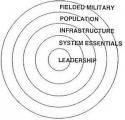Ken White can tell you the story from a military and police standpoint, since he was on the professional team that went in and managed to bring some order to chaos.from David
Now a long time ago, how about the deployment of US troops in the USA, during the rioting in Detroit and elsewhere? Was preparation for criminal trials excluded?
My experience was post-Ken's (by a couple of weeks), as part of the editorial team from Michigan Law Review that investigated and wrote up a report on the legal aspects - which I don't think is online.
Very simply, Detroit in its legal aspects (particularly, perservation of evidence) was well beyond "Fugged up".










 ).
). I do remember when we were IRC (Initial Ready Company) they put what was called a stop lock on our M-16's, this is a device inserted into the weapon by the armorer that prevented the selector switch from being placed on full automatic as that was forbidden in all anticipated caes in which we would deploy. More later.
I do remember when we were IRC (Initial Ready Company) they put what was called a stop lock on our M-16's, this is a device inserted into the weapon by the armorer that prevented the selector switch from being placed on full automatic as that was forbidden in all anticipated caes in which we would deploy. More later.



Bookmarks